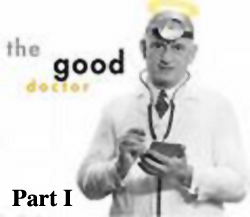
Healthcare is critically ill. Numerous cures have been applied to this patient with no improvement. Indeed, despite millions of people trying and tens of trillions (yes, with a "t") of dollars, the patient is sicker than ever. WHY?
Healthcare is the victim of well-intentioned people producing what systems thinkers call "fixes that fail, or worse backfire." There are two reasons why this happens: 1) The solutions are not medical; and 2) The solutions treat symptoms not causes, explained in Part II, coming.
By "not medical" I means that both past and presently proposed answers are political, managerial or fiscal. If you are a hammer, everything looks like a nail. If you are a politician, manager or economist, you see healthcare as a problem in politics, management or financing. But healthcare is ill and to cure a Sicko, you need a good doctor.
As a politician, you seek a political solution. Political solutions are by nature compromises, the "art of the possible" per Otto von Bismarck. In politics, you do what you can; rules must be obeyed; logic and collaboration are the sole prerequisites for decision making; process is everything; and feedback is only in amplifiers.
In medicine, you do whatever it takes (literally) to help the patient, period. The standard, the allowable, or even the possible are not accepted as limits: there are no constraints other than ethics. If the process or the rules do not serve the patient, the good doctor ignores, avoids or circumvents them. Collaboration is nice but the only collaborator the good doctor requires is the patient, from whom the doctor gets direct feedback. The good doctor bases decisions on hard scientific evidence rather than last case experience or logic. As science fiction author David Weber quipped, "Logic [alone] is a way to err with confidence."
Compare a political solution with medical treatment of a problem. Most everyone agrees that a national health information system (HIS) would save lives as well as money. To develop a HIS, the good politician schedules hearings; listens to all stakeholders; does surveys; engages lawyers; eschews disruption of current systems; has budget meetings and creates numerous subcommittees; etc. The good politician might have a complex HIS in 20 years, one that satisfies everyone and therefore satisfies no one.
The good doctor, emulating Kelly Johnson of the famous SkunkWorks, gathers some end-users and computer designers; locks them in a room with no windows, no rules and no limits; tells them what we need; they design, test, redesign and retest; and in six months, they have a functional prototype.
Management approaches such as TQM (total quality management); TPS (Toyota Production Systems); and Six Sigma (6σ) have been proposed as cures for healthcare. These are implementation tools, not directed solutions for specific illnesses. The good doctor knows the difference between a scalpel and the blocked artery that the scalpel can open.
The most recent answer for healthcare is a fiscal one, presumably because the problem appears to be money or more precisely, the extreme cost of health care itself or of medical insurance.
The financing of healthcare IS a huge problem. The good economist asks two questions: how much it will cost and where is the money coming from? The good doctor asks two different questions: what is causing the financial crunch and what is causing the cost spiral to skyrocket?
The good doctor would discover the answers to the two previous 'cause' questions and propose treatment to resolve those causes. The good doctor knows that putting more money into a system will cure it IF AND ONLY IF the cause of sickness is lack of money.
Healthcare is a sick patient. A good politician, an expert manager, or a brilliant economist cannot cure a sick patient. Healthcare needs a good doctor.
In Part II, we will consider two additional questions: 1) Who is the "good doctor" and 2) What will she do?
